Contents
Market Overview
Macro Review
This was a week in which the S&P struck four daily consecutive all-time highs. In fact, the S&P has now reached 48 daily all-time highs this year alone and is up 18.9% YTD. This comes as U.S. CPI came in softer as PPI was higher than expectations, although UMich consumer sentiment dipped to its lowest level since December 2011. This ultimately re-priced U.S. Treasuries 3-5bp tighter, with the 10yr settling closer to 1.30%. Meanwhile, the moderation in views across Fed speakers followed as Daly and Evans became incrementally hawkish. This was more significant for Evans as an outright dove, who postured that the current inflation spike should not push the Fed to surreptitiously tighten policy. Elsewhere, gold endured a brief flash-crash at the start of the week and the PBoC expressed willingness to cut the RRR policy rate further to spur growth. Speaking of Chinese growth, both GS and JPM downgraded their growth forecasts. Otherwise Zambian elections kicked off on Thursday, although we can expect the results to feed in over the weekend.
EM Credit Update
EM sovereign credit ended the week down 0.4% with spreads 1bp tighter, but corporate credit was flat and 5bps tighter. Outperformers on the week include Tunisia, Argentina and Slovakia, while Sri Lanka, El Salvador and Zambia lagged.
The Week Ahead
Next week will see Chair Powell speak on Tuesday. The market will hope for further insight during his Jackson Hole remarks later this month and whether he has become less dovish. Beyond that, FOMC minutes and retail sales will be watched. Speaking of retail sales, Chinese data is expected to come in at 10.9% as industrial production moderates with the delta variant, although we would expect the 1yr and 5yr loan prime rates to remain unchanged (3.85% & 4.65%, respectively). Similarly, Indonesia (3.5%) is expected to remain on hold. In terms of inflation, Hong Kong, Israel, Poland and South Africa stand out. Thereafter, it is more a theme of 2Q GDP releases from Chile, Colombia, Hungary, Israel, Peru, Romania, Thailand and Ukraine.
Highlights from emerging markets discussed below include: China releases a medium-term regulatory outline and credit growth slows, El Salvador considers pension fund nationalization to meet financing needs and global emerging market corporates in focus: considering climate change.
Fixed Income
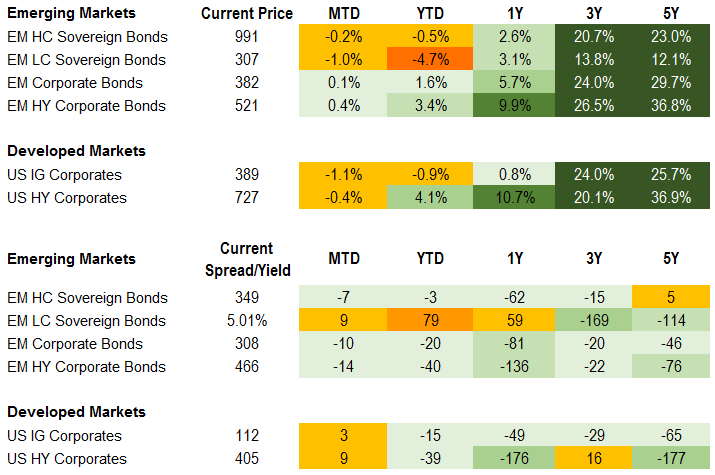
Equities
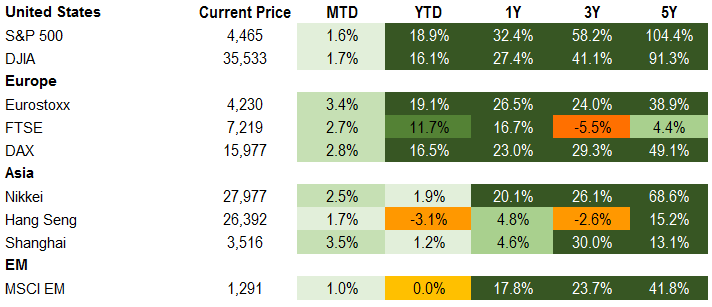
Commodities

Source for data tables: Bloomberg, JPMorgan, Gramercy. EM Fixed Income is represented by the following JPMorgan Indicies: EMBI Global, GBI-EM Global Diversified, CEMBI Broad Diversified and CEMBI Broad High Yield. DM Fixed Income is represented by the JPMorgan JULI Total Return Index and Domestic High Yield Index. Fixed Income, Equity and Commodity data is as of August 13, 2021 (mid-afternoon).
Emerging Markets Weekly Highlights
China releases medium-term regulatory outline; credit growth slows
Event: The CPC (Communist Party of China) Central Committee and State Council released a report titled “Outline for the Implementation of Building a Rule of Law Government (2021-2025)”, which provides greater insight on the government’s agenda and associated goals for regulation and legislation in sectors related to national security, technological innovation, and social priorities. On the economic data front, credit growth and total social financing eased in July with the latter dropping just below 11% y/y on slower shadow bank lending and government bond issuance.
Gramercy Commentary: The regulatory document reaffirms our view that targeted sectoral pressures will persist for some time in order to achieve the government’s desire to improve equality, enhance data security, reduce monopolistic behavior, manage financial risks, and pursue environmental sustainability. While related volatility will still likely ensue, the outline suggests, in our view, that authorities will aim for greater transparency and guidance ahead of changes in the future in order to smooth implementation and balance private sector interests. On the credit data front, we expect stabilization in the coming months and any further weakness to lend support to additional RRR cuts.
El Salvador considers pension fund nationalization to meet financing needs
Event: Amid short-term financing pressures due to constraints of dollarization and limited access to external capital, the government is reportedly considering pension fund nationalization as an avenue for financing. Following Moody’s downgrade of El Salvador’s ratings to Caa3 at the end of last month, combined with constitutional reform, challenged U.S. relations, and heterodox policy indications, the government’s bonds remained under pressure dropping nearly 10pts in two weeks.
Gramercy Commentary: The potential for this funding approach further increases the probability of a heterodox scenario and further distances the government from IMF financing. The specifics of how the government would utilize the pension funds to support its fiscal accounts are uncertain but range from reduction in transfers to the administers, which are roughly $300-400mm a year, a sale of assets, or a cancellation of government pension bonds. Absent clarity on access to sustainable financing and indications of near-term policy improvement boosting prospects for multilateral support, we expect asset prices to remain volatile.
Global emerging market corporates in focus: Considering climate change
Event: In the latest Assessment Report, the Intergovernmental Panel on Climate Change (IPCC) concluded that “human induced climate change is already affecting many weather and climate extremes in every region across the globe”. The report also concluded that with incremental global warming, changes to regional mean temperature, precipitation and soil temperature are expected to become larger in frequency and intensity. The report paints a truly dire picture of climate change.
Gramercy Commentary: For some frontier and emerging market countries still seeking to build domestic industrial bases, it may appear as though the music has all but stopped even though these countries are yet to make their mark at the industrialization party. Others that are already facing some of the worst effects of climate change may think these stark warnings could not have come soon enough. For countries in the former group (and the related corporates), there is the opportunity to build more environmentally conscious industries, powered by greener fuels. For those in the latter group, the report may renew hopes that more countries will set ambitious targets in seeking to reduce emissions of greenhouse gases. Global warming clearly has several, wide-ranging implications for emerging market corporates. Companies operating in the fossil fuel industry may increasingly look to offset the impact of their activity, especially if these companies face pressure from investors or from banks which lend to them. Issuers in the meat industry do not appear to have faced the same amount of pressure yet, but these corporates may need to address similar challenges as counterparts exporting crude oil. Potential business disruption from increasingly frequent flooding and other extreme weather conditions may reduce revenues and raise costs (including insurance) for corporates in disparate industries. Where corporates are aligned with the transition to green, there has already been a significant increase in demand for production. In some cases, the rise in demand has been so great that it has resulted in bottlenecks. In conclusion, while many countries could target climate change more aggressively, the direction of travel is clear. Emerging market corporates will need to confront this challenge.
Emerging Markets Technicals
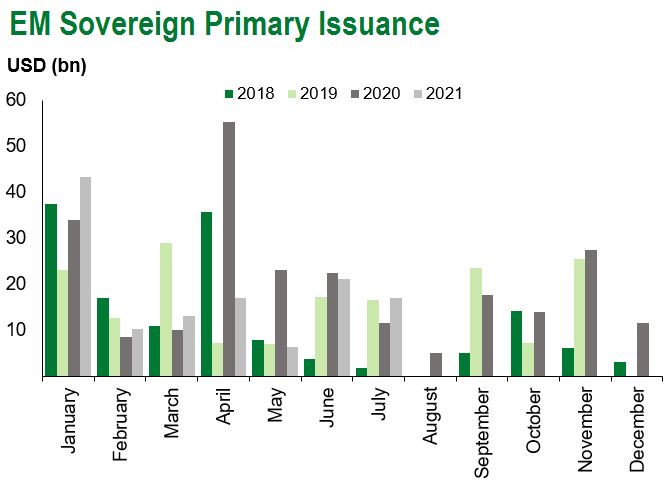
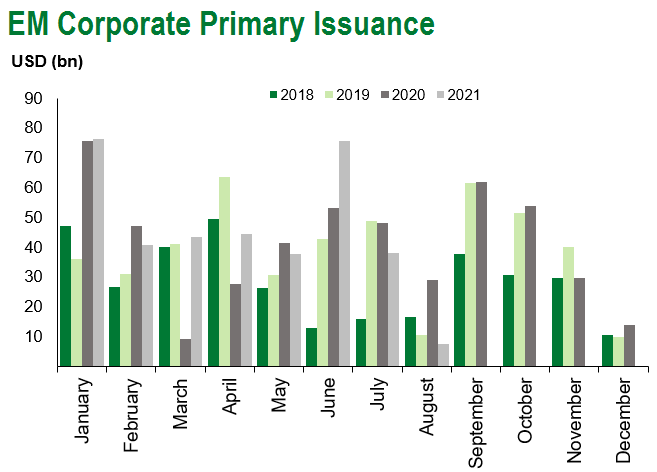
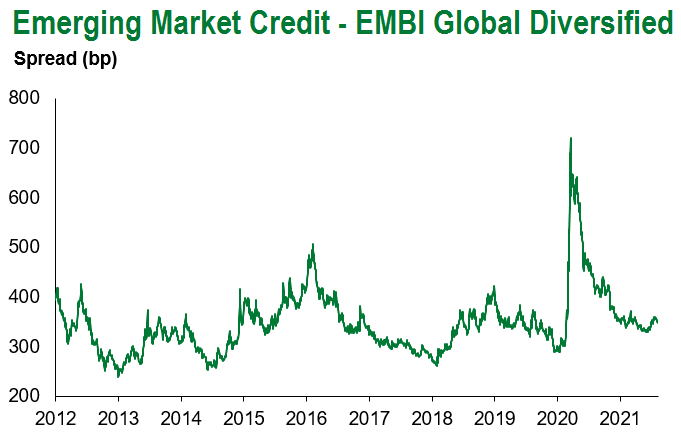
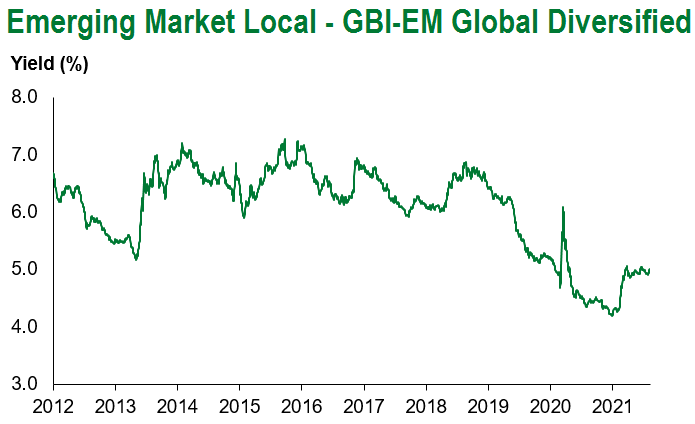
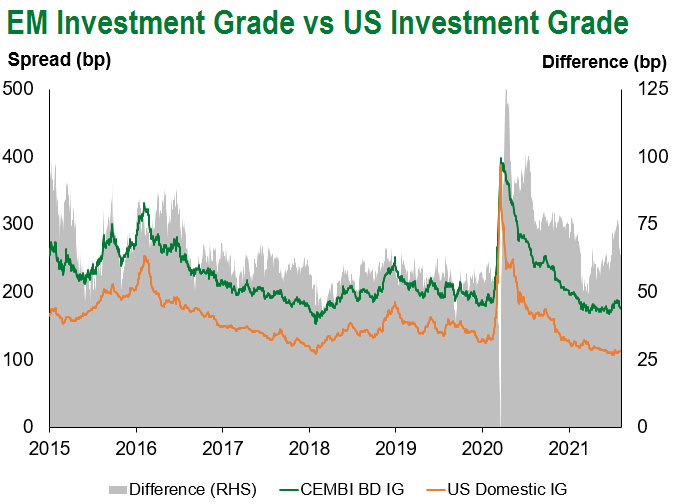
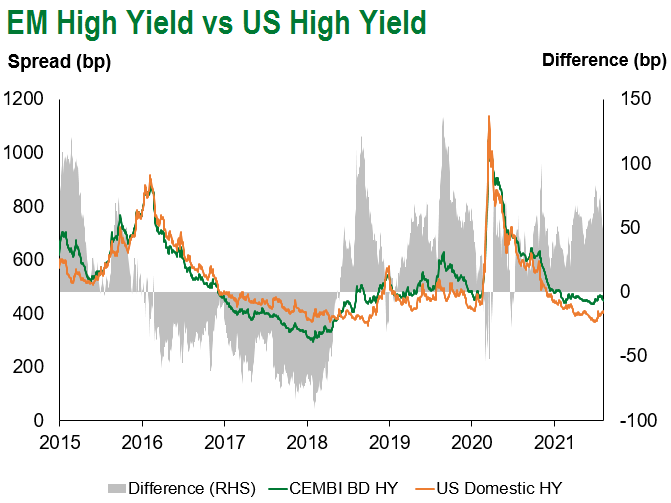
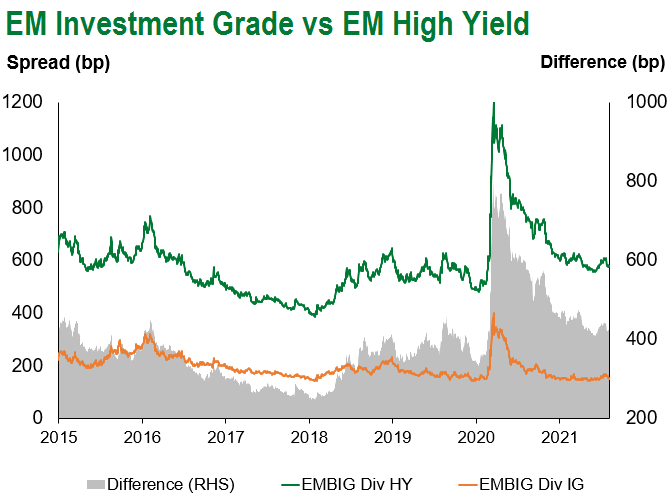
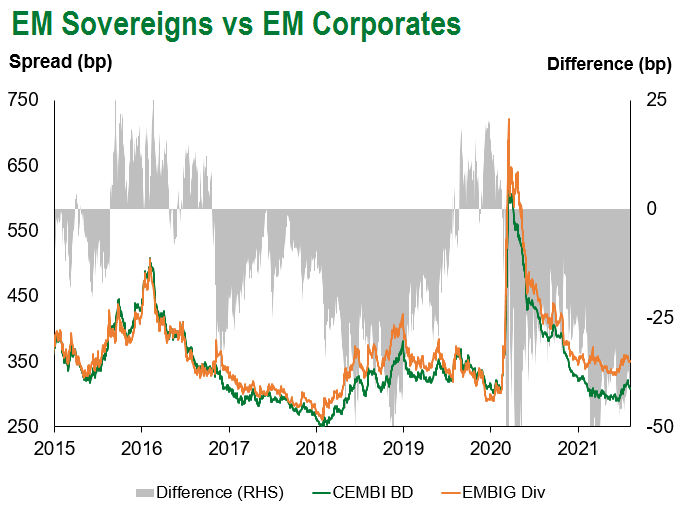
Emerging Markets Flows
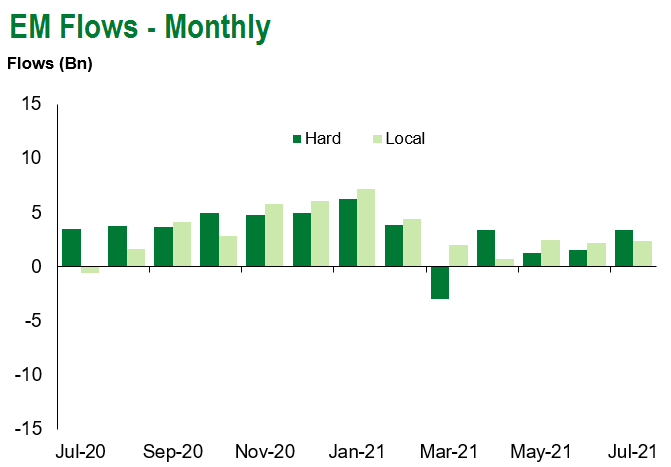
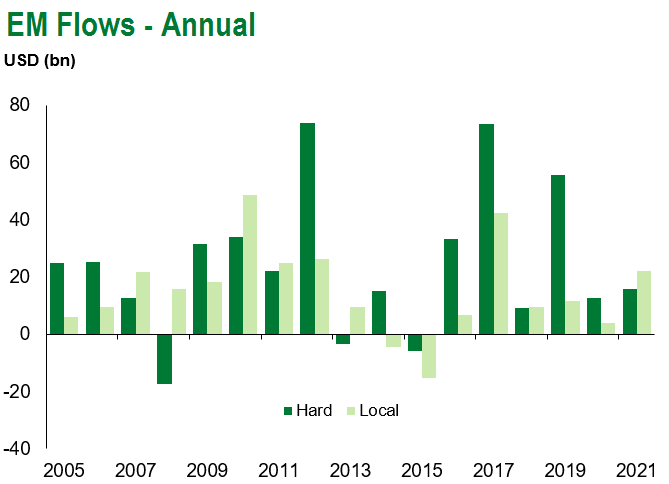
Source for graphs: Bloomberg, JPMorgan, Gramercy. As of August 13, 2021.
COVID Resources
Emerging Markets COVID-19 Case Summary
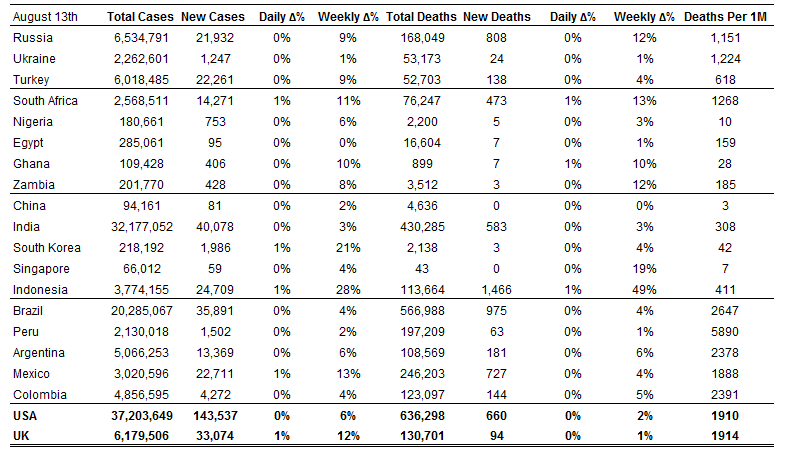
Source: Worldometer as of August 13, 2021.
Additional Crisis Resources:
Johns Hopkins COVID-19 Case Tracker
For questions, please contact:
Kathryn Exum, Senior Vice President, Sovereign Research Analyst, [email protected]
Petar Atanasov, Senior Vice President, Sovereign Research Analyst, [email protected]
Tolu Alamutu, CFA, Senior Vice President, Corporate Research Analyst, [email protected]
James Barry, Vice President, Corporate Research Analyst, [email protected]
This document is for informational purposes only. The information presented is not intended to be relied upon as a forecast, research or investment advice, and is not a recommendation, offer or solicitation to buy or sell any securities or to adopt any investment strategy. Gramercy may have current investment positions in the securities or sovereigns mentioned above. The information and opinions contained in this paper are as of the date of initial publication, derived from proprietary and nonproprietary sources deemed by Gramercy to be reliable, are not necessarily all-inclusive and are not guaranteed as to accuracy. This paper may contain “forward-looking” information that is not purely historical in nature. Such information may include, among other things, projections and forecasts. There is no guarantee that any forecasts made will come to pass. Reliance upon information in this paper is at the sole discretion of the reader. You should not rely on this presentation as the basis upon which to make an investment decision. Investment involves risk. There can be no assurance that investment objectives will be achieved. Investors must be prepared to bear the risk of a total loss of their investment. These risks are often heightened for investments in emerging/developing markets or smaller capital markets. International investing involves risks, including risks related to foreign currency, limited liquidity, less government regulation, and the possibility of substantial volatility due to adverse political, economic or other developments. The information provided herein is neither tax nor legal advice. Investors should speak to their tax professional for specific information regarding their tax situation.